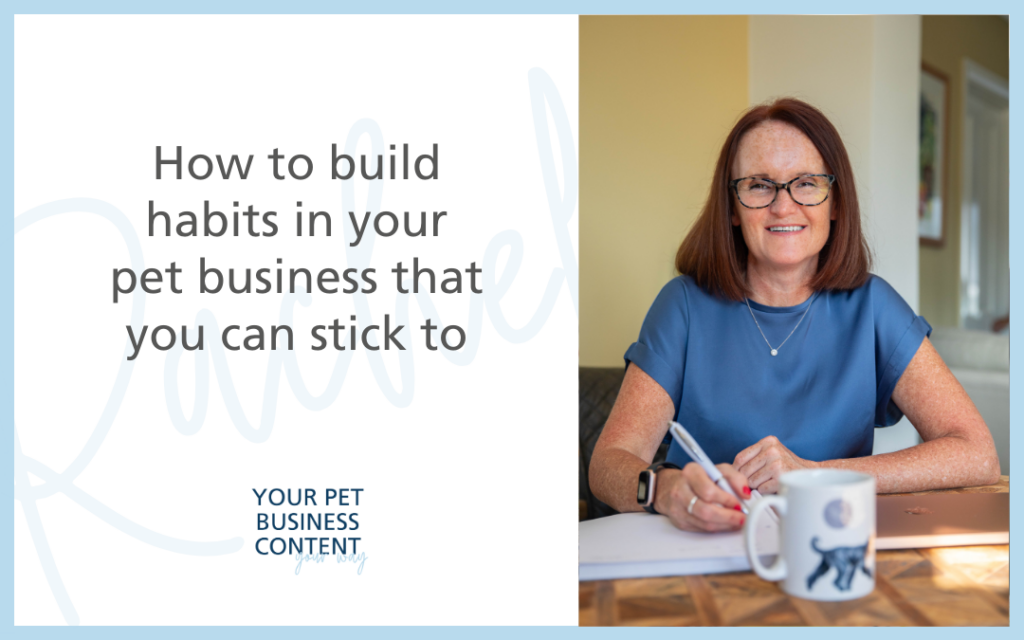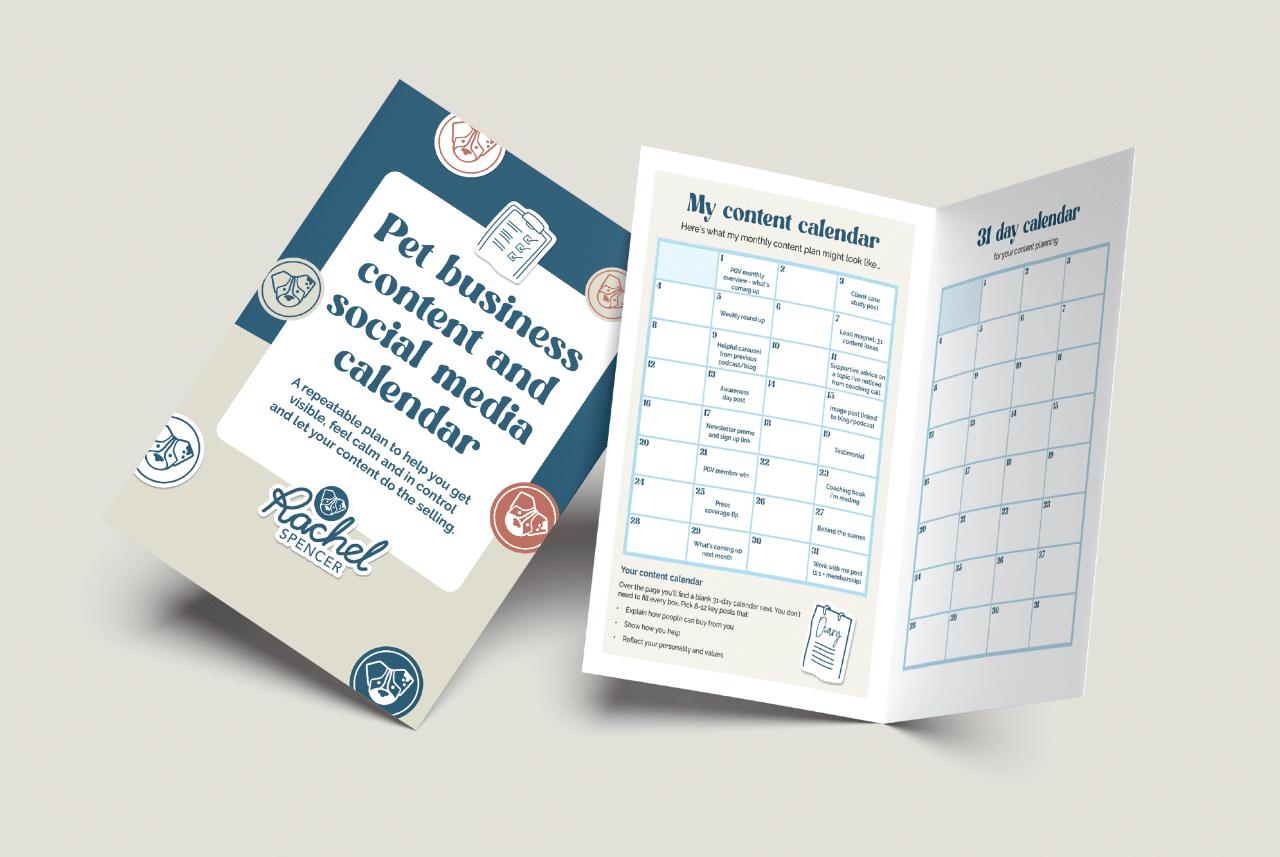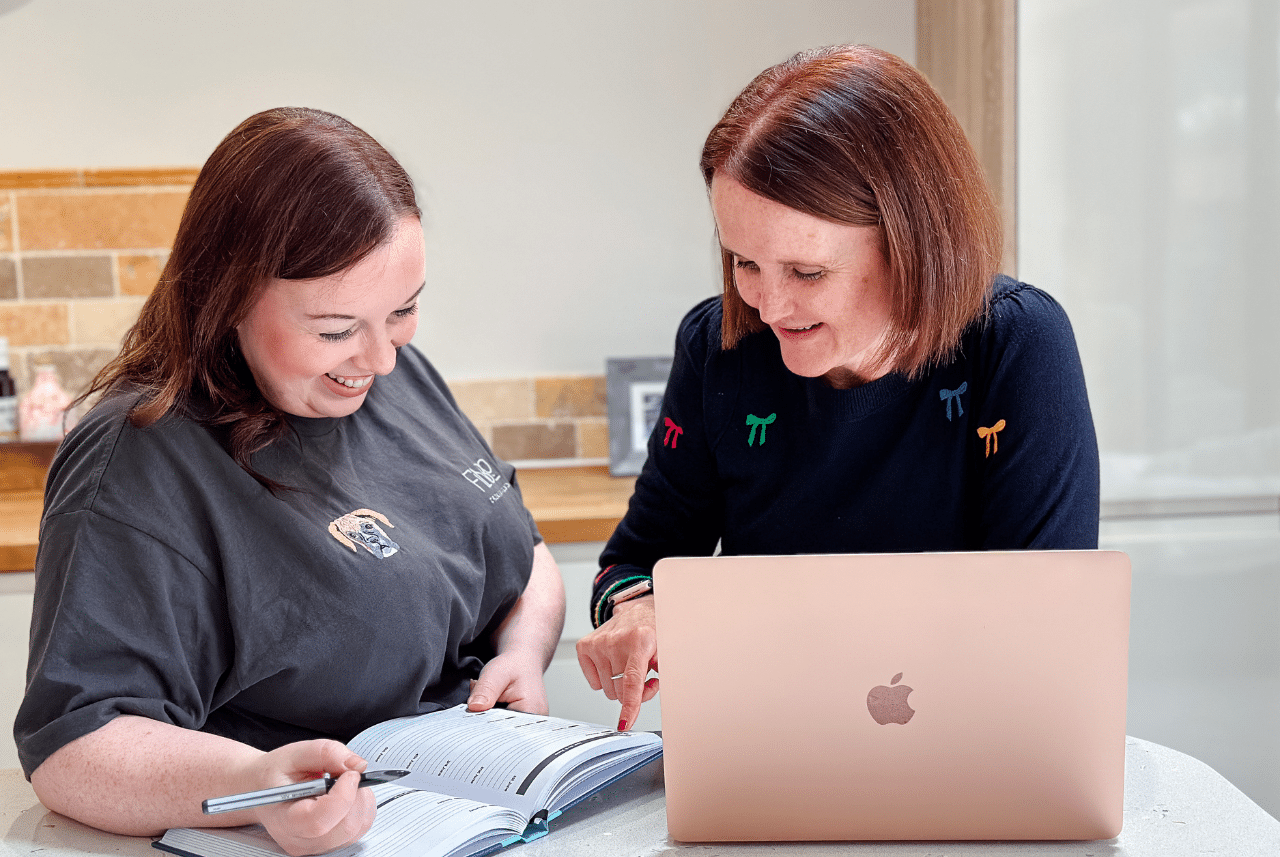Have you ever tried to start something new in your pet business, like a newsletter or a weekly piece of content?
At first, it feels easy, but then life gets in the way, and it falls to the bottom of the to-do list. After a while, it has stopped altogether.
First, don’t beat yourself up. Running a business is a slog, and there are only so many plates you can spin, especially if you’re on your own.
When I have conversations about things people want to be doing, they often talk about willpower and a lack of it leading to them not doing the ‘thing.’
But there’s a lot of research into whether willpower really is the key to having the self-control to either do something consistently or stop doing something.
When it comes to the things you want to implement in your business, it’s more about creating habits that you can sustain.
These habits can make your day or week feel more manageable, ensure you do the things you need to do to power your business, reduce ‘decision fatigue’, and help you grow your business.
In this podcast, we’ll look at how to create habits, why they matter, and how to stick with them when life gets busy, plus case studies and further reading.
Caveat – I’m not an expert on this – I’ve researched the topic as I would as a journalist and brought in what I’ve learned as a coach to try to help you.
The willpower myth
Does it frustrate you that other people seem to consistently post on social media or send out a weekly newsletter, while you struggle to keep up?
You want to change, but it feels impossible? It could be down to your genes – not just willpower.
In an article in Women’s Health, Pete Williams, founder of Functional Medicine Associates, explains that some people with genetic variations, especially those with lower dopamine levels, seek more frequent rewards.
Speaking about his work with obese patients, he says: “It’s completely enlightening for them when we say, ‘Look, this is a part of you that is unconsciously controlled.’ They learn there are forces, genetically led, driving them to make those decisions.”
Similarly, if you find yourself struggling with consistency in your pet business, such as posting on social media or sending newsletters, it might be more than just a lack of willpower.
There could be underlying reasons affecting your ability to stick to these tasks. But like the patients Williams describes, understanding the cause is the first step to change.
What are habits and why are they important?
A habit is defined by the UK’s National Health Service (NHS) as ‘a routine behaviour that is repeated regularly and tends to occur subconsciously.’
Habits are automatic responses triggered by specific cues in our environment and are formed through repetition.
For example, brushing your teeth when you wake up and before bed.
The more often a behaviour is repeated in the same context, the more ingrained it becomes, requiring less conscious thought over time.
Habits are about learning and changing.
We learn we want to do something differently, and the change we make becomes the habit, leading to positive change.
The reason why building habits around the things that are important to you can help you as a business owner is due to decision fatigue.
You’re making hundreds of decisions each day, from making your product to managing appointments to ensuring animals are cared for properly, and this is draining.
With a habit, the tasks become automatic, so you free up valuable headspace or mental energy for the bigger, more creative aspects of your business.
For example, if you have a habit to check your emails at 8:30am to 9:00am each day or to write out your calendar every Sunday night, it prevents emails from piling up, reduces stress from not knowing what you’re doing from one day to the next, and helps you feel organised.
The ‘change curve’ in relation to habits
The ‘change curve’ was created by Elizabeth Kubler-Ross in the 1960s and can be useful when looking at how habits work, in the stages of ‘experiment, decision and change.’
For example, if you don’t see yourself as the kind of person who exercises regularly, but you want to build a habit of doing so, you might experiment with different types of exercise – running, yoga or circuit training.
Next, you make a decision that you want to challenge your old belief and make regular exercise something you do, so you sign up for a gym where you can join three sessions a week or join a running club.
Then you make the change, and the habit becomes established – part of who you are. Focus on forming the new habit rather than trying not to continue the old one.
Building habits that stick
So, how do you build ones that last and don’t fall by the wayside?
- Define WHY you want the habit
Consider the thing you want to do and the reason why. By getting this clear, you’re getting a vision of the new you when you adopt the habit, and thinking about the consequences of not creating the habit, and it’s more likely then that the habit will follow. - What’s your energy like?
How do you feel about the habit you’re planning? Are you excited about it? If so, you’re more likely to stick to it. If not, is there an alternative. - Plan
How are you going to fit your habit in? Consider time, space, family commitments, your strengths and skills too. - Start small
Don’t try to overhaul your entire routine overnight. Begin with a micro-habit – something so small that it’s impossible to fail. - Create an environment to succeed
This is where you ensure your environment sets you up for success and take away any obstacles that might stop you. - Stack your habits
Habits are much easier to stick to when they’re triggered or bolted on by something you already do. - Reward yourself
Positive reinforcement isn’t just for animals – it’s for you too, and it helps habits stick.
Barriers to building habits (and how to overcome them)
These are some of the common obstacles or objections to building habits that I hear from my coaching and membership clients:
- “I don’t have time to form new habits.”
It’s easy to feel like there’s no time to add something new into your routine. But starting with micro-habits – like spending just 5 minutes on client updates – requires minimal time and effort. The key is to make it so small that it doesn’t feel like an extra task. - “My schedule is unpredictable.”
No two days are the same, and things will happen that derail you. Some days you’ll get nothing done. Be flexible and adapt when you need to. If your habit is to check your emails in the morning but you need to take your pet to the vet, just do it when you can. - “What if I fall off the wagon with my new habit?”
It’s not the end of the world. If you miss a day of your morning routine, start again the next day, and don’t be hard on yourself. If you’ve missed your newsletter for a couple of weeks, start again. Or, if you’re going on holiday and taking a break, explain that you’re missing a week and will be back – so you have that accountability.
How coaching can help you build lasting habits
Building strong habits can be tough, especially when you’re juggling so much, and this is where coaching can make a big difference.
The right coach doesn’t just give you a to-do list – they help you define what’s important and why, so you build the confidence and strategies needed to form habits that stick.
Coaching provides personalised support, as everyone’s habits are different, and your coach will help to keep you accountable and on track.
Choosing the right coach:
There are different coaching styles. Some offer a structured, step-by-step approach, while others empower you to find your own solutions.
If you’re looking for a coach who will guide you in building habits tailored to your business, a more personalised, person-centred approach might be the best fit.
For more on coaching, listen to Choosing the right pet business coach
What kind of habits might help your pet business?
Marketing and communication habits
No matter what you do in your pet business, you’re always communicating your services to potential clients. Developing a habit around helps you stay consistent.
Yours might be to plan social media posts on a set day or schedule them every Friday or sending a newsletter every Thursday at 7pm.
Plan out when and how you’ll capture ideas for content and where you’ll create it.
Customer communication habits
Managing how you communicate is essential to staying organised.
Create a habit of checking and responding to emails or social media messages at set times each day – starting with email, then Facebook, followed by Instagram or LinkedIn.
Once that’s done, you can focus on other tasks without being distracted by incoming messages throughout the day.
Invoicing and admin habits
Paperwork and finances can be a chore, but being on top of them reduces your mental load and eliminates guilt or stress from tasks building up.
Set a time at the end of each day or week to handle invoicing or financial admin, like inputting expenses, as this helps you make money!
By creating routines around your most important tasks, you’ll find that your business runs more smoothly, and you’ll have more head space for the things you enjoy.
Recommended reading on habit building
If you’re looking to learn more about habits, here are some books to help you understand the science behind habit formation and how to apply it to your pet business:
- Atomic Habits by James Clear
This is a fantastic resource for anyone looking to make small changes that lead to significant results. Clear breaks down the process of habit formation into actionable steps and shares practical tips for building habits that last. It’s all about focusing on small, 1% improvements that compound over time. - The Power of Habit by Charles Duhigg
The book explains the ‘habit loop’ – a cue, routine, and reward – which drives human behaviour. Duhigg discusses how we form habits and how they can be reshaped to achieve goals. It’s a great read for anyone looking to create lasting change for personal growth and business success. - The One Thing by Gary Keller
This book focuses on narrowing your focus to just one priority at a time. It’s an excellent guide for pet business owners who want to build sustainable habits by focusing on what matters most. By mastering ‘the one thing,’ you create momentum and achieve more with less effort.
These books offer insights into the psychology of habits and practical ways to make them work for you. For just over a tenner, they are well worth the investment.
Join the membership or book a one-to-one session
If you’re ready to get hands-on help with building habits in your pet business, consider joining my Pets Get Visible membership for ongoing support, or book a one-to-one session to talk through your ideal habits and goals.
Whether you need accountability or guidance, there’s an option that will work for you.
Join Pets Get Visible and get 50% off your first month here.
Book a 1-1 session here
Further listening
Kerry Jordan on the importance of building relationships to grow your pet business
Is my Pets Get Visible membership right for you?
How to choose the right pet business coach
How to create consistent content
How to create a social media calendar for your pet business





